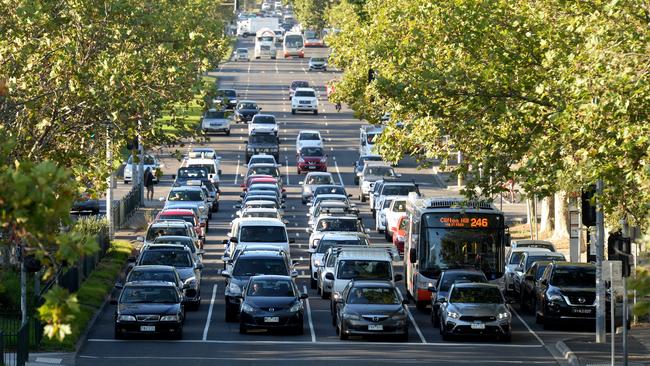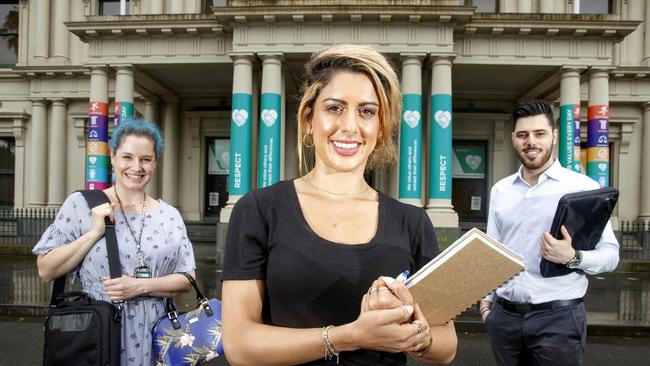All state run vaccine clinics now open for walk in jabs
Victoria reached a milestone of having 10,000 people living with disability or special needs receiving a Covid vaccination through the Australian-first Disability Liaison Officer program.

Coronavirus
Don't miss out on the headlines from Coronavirus. Followed categories will be added to My News.
This coronavirus article is unlocked and free to read in the interest of community health and safety. Tap here for full digital access to trusted news from the Herald Sun and Leader for just $1 for the first 28 days.
In an effort to further ramp up Victoria’s Covid booster shot program, all state run vaccine clinics have now been open for walk in jabs.
Minister for Disability, Aging and Carers Anthony Carbines said the government was making sure all Victorians have access to a Covid vaccine.
“If you need support accessing a Covid-19 vaccine for a health service, and you are living with disability, or have any issues or other requirements, liaison offices are here to help you get your vaccinations.“
Victoria reached a milestone of having 10,000 people living with disability or special needs receiving a Covid vaccination through the Australian-first Disability Liaison Officer program.
Deputy Secretary for Victoria’s Covid response Naomi Bromley said the state’s vaccination program was evolving to better suit the more mobile community, with programs focussed on taking booster jabs to the people rather than requiring the population to queue at vaccination hubs.
“Convenience is a really important part of the program now, particularly when the economy is open as we have now,” she said.
“We do have so many different ways to provide vaccination that speak to the convenience of people who are just going about their day.”
Victoria has recorded 5874 Covid cases and 15 deaths on Friday.
There are 281 people with Covid in hospital, with 43 in intensive care and 5 on ventilators.
The state has 40,968 active cases.
Return to office advice
As Some Victorian took the opportunity to step out maskless, Mr Carbine said it was difficult to project how many Victorians would embrace the opportunity to return to their offices on Monday.
“There’s no doubt that as more and more workers are encouraged to return, it will be horses for course and all the different arrangements for different workplaces,” he said.
“But there’s clearly a strong desire for Melburnians to get back to the city and back to the workplaces and we’ll start to see that ramp up now.”
Mr Carbines said it was up to individual workplaces to implement strategies for the safe transition and monitoring of those returning en masse to CBD offices.
“The government have made it clear that we are keen to see the flexibility to be able to return to workplaces,” he said.
“But I think we’ll have to see through next week what the level of enthusiasm and the desire to get back to workplaces is…and I’m sure we’ll see more of that from Monday.”
A human resources expert has warned of higher staff turnover as people return to commuting on Monday.
As the state government scraps its recommendation to work from home, Corporate Dojo founder Karen Gately expects showdowns between bosses and staff, with many reluctant to ditch the flexibility of the past two years.
“Clearly we’ve got employers who will say ‘work wherever you want’ but I’d say the majority want staff back onsite, at least in some capacity,” Ms Gately said.
“The employer that says work must be done fully onsite is really creating a hard position for themselves.”

“The demand for flexibility is huge. Progressive employers pre-Covid recognised that, but now people have had a taste of it and employers, in many ways, had been forced to go down that path, so the way they react post-Covid will be telling.”
Ms Gately said employers should not be too quick to hurry staff back to their desks because it could ultimately drive them away.
“It may be that people need time to transition, so bosses need to recognise that going from one reality to another might be really jarring to people’s lives,” she said.
“Even if a business is aiming to get people onsite full time, they need to give their workers time to work out their needs.”
She added that employers should move past the assumption that workers were less productive in non-office environments.
“My prediction is that we will see a lot of turnover in staff,” Ms Gately said.
“Given the unemployment rate, I don’t think it’s going to be too hard (for workers to leave). Smart employers will say ‘come in our direction because we are a flexible workplace’.”
Steve Michelson, of strategic communications firm Michelson Alexander, said his company deemed Mondays, Wednesdays and Fridays “all-in-work days” to boost morale.

“Like most businesses, we have struggled balancing the Covid risk with our team’s eagerness to close the Zoom browser and get back to socialising and collaborating with our clients and colleagues in person,” he said.
“To try and counter this, we have established all-in workdays where we have everyone working together in the office, two optional work-from-home days, additional social activities and the introduction of an office dog named Max.”




